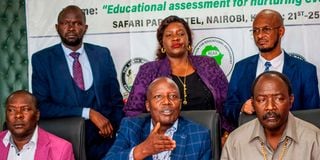Probe reveals no major anomalies in 2022 KCSE

National Assembly Education Committee chair Julius Melly (seated, centre) and other members during a press briefing at the New Mitihani House in South C, Nairobi, on August 31.
A National Assembly committee probing allegations of massive irregularities in the 2022 Kenya Certificate of Secondary Education (KCSE) has poked holes in the administration of the exams, but found that the results did not deviate much from previous editions.
In a report submitted to the National Assembly, the Education committee, chaired by Tindiret MP Julius Melly, has also recommended a number of changes to ensure the integrity of the national examinations.
“The committee observed that the trend and comparative analysis of the performance of the 2022 KCSE examination results against the performance of previous years (2019 - 2021) was normal and there were no significant deviations and anomalies,” reads part of the report.
The report notes that there were isolated cases of examination malpractice perpetuated by the use of technology and early release of examination papers.
The MPs have recommended stiffer penalties for examination-related offences as well as more funding for the Kenya National Examinations Council (Knec) to enable the body to deal with the menace.
Also Read: MPs to begin exam malpractices probe
“These cases were orchestrated by teachers, invigilators, supervisors, principals, security officers and Knec officials. Motivational speakers also played a role in fuelling the cases of examination malpractice by claiming to have knowledge of the questions that will appear in the main examinations,” the MPs observed.
Some of the cases of irregularities identified include collusion, possession of unauthorised examination material, possession of mobile phones and impersonation.
The Directorate of Criminal Investigations told the committee that 44 cases related to the 2022 KCSE exams are under investigation, 17 are in court, six cases have been concluded and one arrest warrant has been issued.
The investigation began after allegations of massive irregularities were made following the release of the exam results.
Education Cabinet Secretary Ezekiel Machogu denied the allegations and made presentations to the committee as it investigated the matter. Various stakeholders from across the country also made written and oral submissions.
The report, which will now be debated in Parliament, comes less than a month before the 2023 candidates sit their KCSE examinations.
It notes that the malpractices and cheating took place despite “sufficient measures” being put in place by the Ministry of Education and Knec to curb the vice.
“As a result of the foregoing, the committee is of the view that the Knec guidelines are not being strictly adhered to. The rules and guidelines are also not effective enough to deter examination malpractices arising from emerging trends such as technological advancements, as the regulations are outdated,” the report says. It suggests a review of penalties for cheating to deter offenders.
The MPs also found fault with the marking of the exams, noting that the integrity of the examiners, the marking schemes, the awarding of marks and the moderation process, as well as “activities in the marking centres were shrouded in mystery”.
According to the report, examiners were subjected to long working hours which affected their productivity, and accommodation was in “poor and deplorable conditions which demotivated examiners”. Their pay was also delayed for nine months after the exercise was completed.
The committee faulted Knec for failing to carry out independent periodic audits. This, it says, is important for continuous improvement and quality assurance.
The committee has instructed the Teachers Service Commission (TSC) to find other parameters for teacher promotions and not to base them solely on the performance of individual schools.
“From the 2024-2025 examination cycle, the TSC should include other parameters such as discipline, infrastructural development, co-curricular activities and personal development of teachers as part of the requirements for promotion of teachers,” the report said.
In another drastic recommendation, the MPs have suggested that headmasters, who currently act as examination centre managers for their own schools, be deployed annually to administer examinations in schools outside their sub-counties.
“From the 2024-2025 examination cycle, [Knec] should restrict invigilators, centre managers and supervisors from supervising examinations in a particular centre for more than two consecutive years.
“The government should allocate sufficient funds to the Ministry of Education and school boards for infrastructure improvements and investment in artificial intelligence-enabled closed-circuit television in all examination centres,” the report says.
The MPs say candidates who are indisposed or hospitalised for various reasons should not be forced to write their papers in hospital wards.
Where there is credible evidence, affected candidates, including those affected by natural disasters, will sit supplementary examinations within six months of the previous examination.





